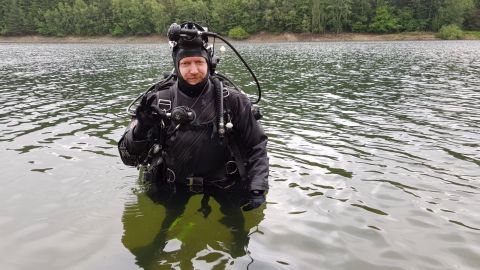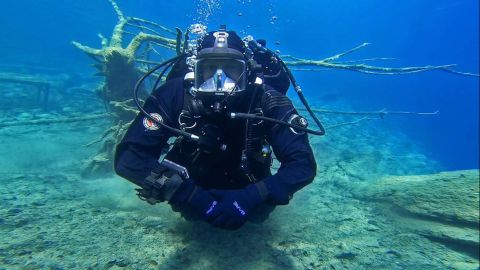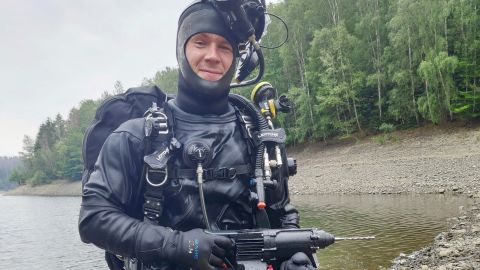The drill in Patrick Spieß's hands is getting heavier and heavier. His vision is getting worse and worse. In order for him to see at all, his head is only 20 centimetres away from the concrete he is drilling through. The police chief inspector is doing backbreaking work - under water.
The loud noises drown out everything around him and he is fully focused on his work - because Spieß is not drilling in his living room or on some construction site, but several meters deep underwater. He is trying out the NRW police's new underwater tool in the Wuppertal dam for the first time. But Spieß and the other police divers are not doing this just like that. They are preparing for operations in the water during training in mid-June.
"This is a very special challenge," says Spieß, who has been diving for more than 32 years and has been working as a police diver for the Wuppertal district police authority since 2007.
The police prepare for a wide variety of operational situations. "Many different operations are conceivable," says Jens Reuter, who is responsible for all central training in the area of technical emergency units (TEE) at the State Office for Training, Further Education and Personnel Affairs (LAFP) of the NRW police - and therefore also for the police divers. Screwing, drilling, flexing, etc.: police divers can be confronted with all of this during operations. But in practice, the special tool, which weighs a good eight kilograms, has little to do with the cordless screwdriver or impact drill from the toolbox at home. "I have to admit, even I had imagined things differently beforehand. The tool had much more power than I expected," says Spieß. Before they even get started, the divers have to adjust the device so that it can withstand the high pressure under water.
"You have to imagine it as if you were inflating a bicycle tire," says Spieß. A pressure pump is used to set the tools to the right pressure that awaits them under water so that they can withstand it. Then it's off into the water - with a weight weighing several kilograms. The floating sensation that you would otherwise feel under water quickly disappears. "It requires a lot of strength and intensive training," says Reuter.
However, it's not just diving that is different, but also working with the device itself. Spieß experienced this for himself during his training in an underwater structure. Simply drilling until the desired depth is reached? It's not that easy in the water. The sediment that comes out of the concrete block mixes with the water and becomes a kind of glue. So the police diver has to take off and put on again and again in order to see anything in the dark depths, while a second diver illuminates the target with a flashlight. At the same time, Spieß has to hold on with one hand so that he doesn't push himself away from the concrete block while he braces himself against the drill to get further into the concrete block.
"We try to prepare as realistically as possible," says Spieß. This is the only way to react well to what awaits you in the field. The new underwater tools play their part in this. "It's great to have such professional options. Technically, that's the best we can do at the moment."


